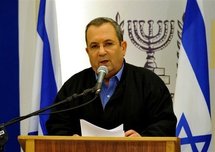Israel's Barak sees green light for talks soon
Steve Weizman
JERUSALEM, Steve Weizman- Israeli Defence Minister Ehud Barak said on Friday that he saw the current diplomacy by the US Middle East envoy leading to agreement within weeks on renewed peace talks with the Palestinians.
"I get the impression there is a very intensive effort to start them," Barak told Israel's Channel One television as US President Barack Obama's envoy George Mitchell met Palestinian president Mahmud Abbas in the West Bank.

Ehud Barak
Palestinian chief negotiator Saeb Erekat said after the Ramallah meeting that an Arab League committee to monitor peace efforts would meet in Cairo on May 1 to discuss "Mitchell's ideas."
He did not elaborate, but earlier Abbas spokesman Nabil Abu Rudeina said any firm proposal to restart talks would have to be endorsed by Arab leaders.
Direct peace negotiations between the sides collapsed in 2008, and Mitchell was on Friday trying to broker US-mediated indirect talks as a prelude to face-to-face negotiations.
There was a generally upbeat tone to his meetings with other Israeli leaders.
Despite a recent chill in relations with Washington, Prime Minister Benjamin Netanyahu said he looked forward to working with Obama "to advance peace."
"We're serious about it. We know you're serious about it. We hope the Palestinians respond," he told Mitchell. "We have to move this process forward."
Netanyahu's office said the two had a "good meeting that dealt with kickstarting the peace process" and would meet again on Sunday.
Israeli President Shimon Peres was also positive on the prospect of reviving the talks that stalled in 2008.
"Your arrival this time is a green light to continue," he told Mitchell.
The envoy later travelled to Ramallah in the Israeli-occupied West Bank to see Abbas, and told reporters that Washington's goal was to achieve a comprehensive Middle East peace "soon, not in some vague and distant future."
Erekat called the meeting "positive," and said Mitchell would return to Ramallah for more talks before leaving the region.
US Secretary of State Hillary Clinton said Obama's envoy was seeking to clear a path to talks on core issues, such as the borders of a future Palestinian state alongside Israel, but was not trying to impose a solution.
"Our goal in these conversations is to advance negotiations over final status issues -- borders obviously being one of them," she told reporters at a meeting of NATO ministers in Estonia.
"There's a lot of ideas that have been floated around, but at the end of the day it's only the Israelis and Palestinians that can make these decisions for themselves."
Mitchell last month convinced the Palestinians to hold indirect talks, only to see the agreement collapse when Israel announced plans to build 1,600 new settler homes in east Jerusalem.
The plan, announced as US Vice President Joe Biden was in Jerusalem promoting the peace talks, sparked a bitter row with Washington. And publicly at least, Netanyahu is not budging.
"There will be no freeze on construction in Jerusalem," he reiterated on Thursday. "Everyone knows it," he told Israel's Channel Two television.
Israel captured the Arab part of the city in the 1967 Middle East War and then annexed it, claiming the whole of Jerusalem as its "eternal and indivisible capital."
The Palestinians want east Jerusalem as the capital of their promised state.
Settlements and the status of Jerusalem are among the thorniest issues in efforts to achieve a resolution of the decades-old Israeli-Palestinian conflict.
The international community considers all Jewish settlements in the West Bank, including east Jerusalem, to be illegal.
Peace talks, revived in late 2007 after a seven-year hiatus, collapsed again after Israel launched a devastating offensive on the Gaza Strip in December 2008.
The Palestinians have insisted they will not return to the negotiating table unless there is a total freeze on settlement construction in the West Bank, including east Jerusalem.
In November, Netanyahu's government announced a partial 10-month moratorium on settlement construction in the West Bank, but excluding east Jerusalem.
-----------------------------------------------------------------------------